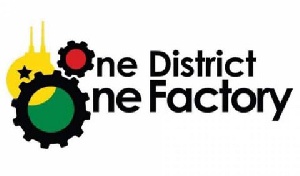 The One District, One Factory policy is a ticket to governement's vision of 'Ghana Beyond Aid'
The One District, One Factory policy is a ticket to governement's vision of 'Ghana Beyond Aid'
A two-day capacity building workshop to train District Planning Committee Units (DPCUs) for the One District, One Factory implementation policy, among others to fit into the national development agenda, is underway at Daboase in the Wassa-East District of Ghana's Western Region.
The workshop seeks among other things, to develop strategies to harness the resources and potentials which abound in mining and agricultural communities to develop their local economies.
It is being organised by World University Service of Canada (WUSC) with funding from Global Affairs Canada and CECI, an NGO, under the West Africa Governance and Economic Sustainability (WAGES) project on the theme," strategies for the implementation of the One District, One Factory Concept".
Speaking at the opening session, a Policy Analyst with ISODEC and Chairman of the Public Interest and Accountability Committee (PIAC), Dr. Stephen Manteaw noted that the oil-find had not been integrated into the medium term plan of most districts and charged the assemblies to take advantage of local resources to develop the local economy.
Touching on vision and planning, he said the current government has tauted a big vision for Ghana just like the previous regime but the difference lies in the strategy to achieve that vision.
Dr. Manteaw gave the reminder that "Ghana Beyond Aid" policy espoused by the President, must look at how we domesticate our local economy with a clear strategy".
According to him, "so long as Ghana depends on multi-lateral donors such as the IMF and the World Bank, our development would suffer".
He said Local Economic Development (LED) planing was an approach to achieving a fair balance of social and economic development with the micro-economic measures at the local level to complement the macro-economic policies of national government.
Dr. Manteaw said the mining expenditure local pattern between 2013 and 2016 indicated that the least share went to the host economy adding that most of the procurement items for the mineral companies werw procured from abroad as they were non-existent in Ghana.
A Local Government Specialist for the WAGES project, Mr. Akwasi Owusu-Bi told the GNA on the sidelines that the programme sought to develop a strategy and a blue print for the One District, One Factory initiative.
He said as a policy, it needs direction within which it can function and a strategy to achieve its goals.
Mr. Owusu-Bi noted that the policy ties in with the sub-sector analysis and market research conducted by WAGES which validated government's initiative on cassava and oil palm project.
He said the ultimate aim of the five-year project to ensure sustainable livelihood to sustain communities after mining activities in the area were over.
Mr. Owusu-Bi said this feat could be achieved through good governance activities which involve accountability, transparency and information flow.
A Research Analyst Mr. Ncholas Adamtey said in an interview that the workshop would focus on developing strategies for Agriculture and Industry and task the participants to mainstream gender and youth as well as environmental issues in the planning process to ensure a broad-based Inclusive planning for the District.
Mr. Adsmtey who also led a discussion on the Planning Processing, reminded development planners that to conduct research and data cllection on what exists before initiating developmental process.
A Field Cordinator of WAGES, Mr. Daniel Arthur Bentum said the project started in 2016 and will end in 2021 which seeks to work in partnership with communities, local government, mining group and other stakeholders to enable particularly women and the youth maximize the socio-economic benefits from the extractive resource investment in the Western Region.
He said the project's principal areas of focus include local government sustainability, inclusive economic growth and Regional knowledge sharing on development of best practices in mining areas.
Mr. Arthur Bentum outlined the expected outcome of the project as increasing employment opportunities for community members notably women and the youth.
It also seeks to strengthen capacity of sub-national government and local institutions to leverage opportunities arising from natural resource development especially the extractive sector and increase internal dialogue on local economic growth and governance strategies in Regions with natural resource development within the three targeted countries and across West Africa.
Mr. Arthur added that the projct would bring about economic diversification and sustainable development.